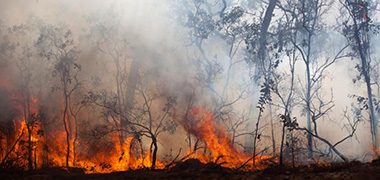
Choose a field of study
Conservation and Land Management
Are you passionate about preserving the environment and looking to turn that passion into a career? The Conservation and Land Management courses offer...
- Regional Coordinator
- Conservation Manager
- Conservation Trainee
- Spotter Catcher
- Volunteer Firefighter
- Park Ranger
- Land Manager
- Indigenous Land Worker
- Ecologist
- Forester
- Conservation Officer
- Land Management Officer
- Soil Conservationist
- Soil Scientist
- Resource Economist
- Conservationist
- Conservation Biologist
- Environmental Science Scientist
- Land Management Worker
- View all
Environmental Management
Are you passionate about the environment and considering a career in Environmental Management? Courses.com.au offers a comprehensive selection of Envi...
- Environmental Officer
- Conservation Trainee
- Sustainability Officer
- Conservation Manager
- Environmental Consultant
- Ecologist
- Environmental Manager
- Environmental Specialist
- Conservation Officer
- Environmental Educator
- Environmental Advocate
- Sustainability Consultant
- Natural Resource Manager
- Environmental Economist
- Environmental Assessor
- Conservation Researcher
- Geographer
- Geomorphologist
- Climate Change Consultant
- Forestry Manager
- Environmental Project Manager
- Ecology Consultant
- Field Assistant
- Climate Scientist
- Conservationist
- Conservation Scientist
- Environmental Planner
- Environmental Advisor
- Sustainability Specialist
- Sustainability Manager
- Water Resource Engineer
- Water Engineer
- Ocean Engineer
- GIS Specialist
- Environmental Policy Analyst
- Environmental Compliance Officer
- Environmental Technician
- Agricultural Engineer
- Environmental Science Scientist
- View all
Marine Conservation
If you are passionate about the environment and looking to make a difference in marine conservation, Courses.com.au offers a comprehensive selection o...
Sustainable Operations
Are you interested in pursuing a career in Sustainable Operations? Courses.com.au offers a comprehensive selection of 66 courses designed to help you ...
Career Pathfinder
Skills shortages + AI Exposure
Discover in-demand careers and understand how each role may be impacted by AI and automation.
- See in-demand occupations across Australia
- Check AI Exposure ratings
- Compare training duration and average income
Popular courses in Environment and Sustainability
Career Opportunities
Popular careers in environment and sustainability include roles such as:
Further reading


3 online courses that can help you tackle climate change
14th January 2020
What can you do with a Certificate IV in Environmental Management and Sustainability?
27th October 2020All courses
- MSS50122 Diploma of Sustainable Operations
- 11130NAT Certificate IV in Environmentally Sustainable Management
- Professional Certificate of Competency in Carbon Capture
- AHC50422 Diploma of Horticulture Management
- 52925WA Graduate Certificate in Water Resources Engineering
- Professional Certificate of Competency in Green Building: Carbon Management in Infrastructure
- Professional Certificate of Competency in Fundamentals of Electric Vehicles
- Garden & Landscape Design Essentials
- Bachelor of Science (Environmental Science)
- Bachelor of Business (Economics)
- CPP40919 Certificate IV in Waste Management
- AHCPMG312 Apply Poison Baits for Vertebrate Pest Control in Rural and Environmental Landscapes
- Bachelor of Science (Sustainability)
- CPP20521 Certificate II in Fire Protection Inspection and Testing
More about Environment and Sustainability courses
If you're passionate about protecting the environment and promoting sustainability, you've come to the right place. At Courses.com.au, we proudly offer a comprehensive range of Environment and Sustainability courses tailored to both beginners and experienced learners across Australia. With a total of 201 courses, including Certificate III in Conservation and Ecosystem Management and Certificate IV in Environmentally Sustainable Management, there's a perfect fit for everyone eager to make a difference in their local environment.
Our platform lists 72 beginner courses perfect for those starting their journey with no prior experience. Courses such as the Certificate II in Sampling and Measurement and Certificate III in Wildlife and Exhibited Animal Care equip students with essential skills and knowledge to take the first step in various careers within the sector. If you already have experience, you can advance your qualifications with options like the Diploma of Horticulture Management or the Advanced Diploma of Conservation and Ecosystem Management.
We understand that learning doesn't have to be confined to a classroom. Several reputable training providers across Australia offer on-campus courses including the Taronga Training Institute in Sydney and South Metropolitan TAFE in Perth. Their hands-on approach helps students dive deeper into their subjects, making them ready for careers such as Environmental Consultant and Park Ranger. Studying locally not only makes the process more convenient but also allows you to connect deeply with your community's environmental needs.
With growing awareness around climate change and sustainability, now is an ideal time to invest in your future. Upon completing our courses, students often find themselves in exciting roles such as Ecologist or Land Manager. Explore the opportunities waiting for you and take charge of your career path in the environment and sustainability sectors. Visit Courses.com.au to browse our extensive offerings and set your foundation for a meaningful and impactful career!

